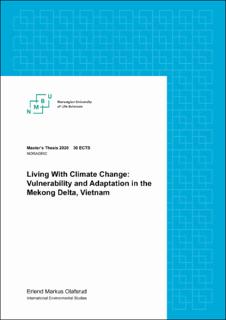| dc.description.abstract | The Mekong Delta in southern Vietnam is a region considered to be among the most exposed to climate change hazards in a global context. When the climate and conditions for farming are changing considerably, adaptation becomes a necessity rather than a luxury for millions of farmers in the delta. This research employs theory on vulnerability, adaptation, and adaptive capacity, with a particular focus on both a contextual approach and an outcome approach to vulnerability. Through semi-structured interviews with multiple actors in the districts of Tieu Can and Tan Phu Dong, certain drivers generating vulnerability among smallholders are identified. Furthermore, the study explores and discusses interventions for adaptation and reduced vulnerability. Findings reveal that climate change is perceived as a severe threat to the livelihoods of smallholders in the districts, especially due to saltwater intrusion and drought. However, market dynamics, upstream dams, diseases on crops and livestock, as well as socioeconomic conditions on household-level are also highlighted as central factors that reduce adaptive capacity and generates vulnerability. The thesis argues that climate change cannot be seen as an isolated threat to smallholder livelihoods, as it takes place in a context where multiple processes are shaping vulnerability and hamper the capacity to adapt. The interventions that are highlighted in the thesis include farmer cooperatives, dykes, adapted agricultural models, changing crops and value-adding, as well as livelihood diversification. These interventions are both technical and social, aiming to address different drivers of vulnerability. Findings indicate that the level of equitability, and the degree in which the interventions succeed in reaching the most vulnerable households, is varying. Finally, as vulnerability is seemingly shaped by multiple stressors, it is argued that adaptation efforts should go further than solely focusing on climate-related issues, and apply a holistic approach where vulnerability is addressed in a broader sense. | en_US |

